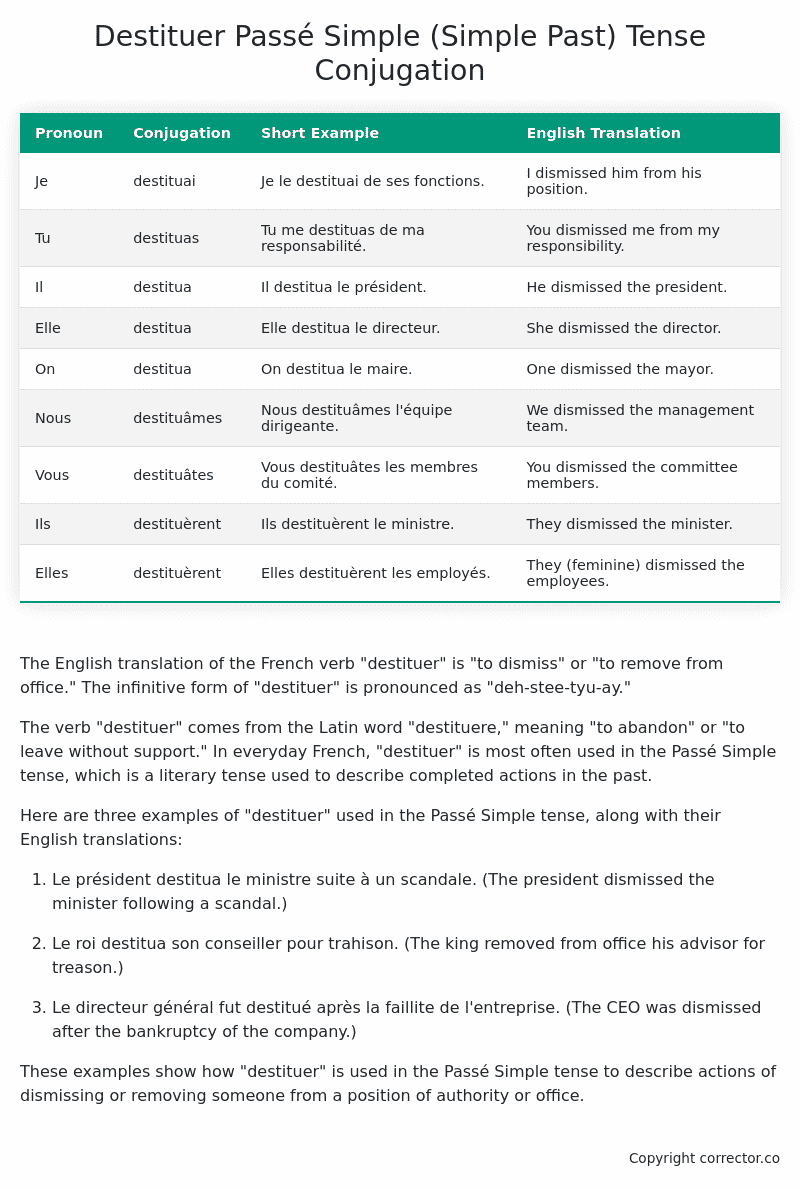Passé Simple (Simple Past) Tense Conjugation of the French Verb destituer
Introduction to the verb destituer
The English translation of the French verb “destituer” is “to dismiss” or “to remove from office.” The infinitive form of “destituer” is pronounced as “deh-stee-tyu-ay.”
The verb “destituer” comes from the Latin word “destituere,” meaning “to abandon” or “to leave without support.” In everyday French, “destituer” is most often used in the Passé Simple tense, which is a literary tense used to describe completed actions in the past.
Here are three examples of “destituer” used in the Passé Simple tense, along with their English translations:
-
Le président destitua le ministre suite à un scandale.
(The president dismissed the minister following a scandal.) -
Le roi destitua son conseiller pour trahison.
(The king removed from office his advisor for treason.) -
Le directeur général fut destitué après la faillite de l’entreprise.
(The CEO was dismissed after the bankruptcy of the company.)
These examples show how “destituer” is used in the Passé Simple tense to describe actions of dismissing or removing someone from a position of authority or office.
Table of the Passé Simple (Simple Past) Tense Conjugation of destituer
| Pronoun | Conjugation | Short Example | English Translation |
|---|---|---|---|
| Je | destituai | Je le destituai de ses fonctions. | I dismissed him from his position. |
| Tu | destituas | Tu me destituas de ma responsabilité. | You dismissed me from my responsibility. |
| Il | destitua | Il destitua le président. | He dismissed the president. |
| Elle | destitua | Elle destitua le directeur. | She dismissed the director. |
| On | destitua | On destitua le maire. | One dismissed the mayor. |
| Nous | destituâmes | Nous destituâmes l’équipe dirigeante. | We dismissed the management team. |
| Vous | destituâtes | Vous destituâtes les membres du comité. | You dismissed the committee members. |
| Ils | destituèrent | Ils destituèrent le ministre. | They dismissed the minister. |
| Elles | destituèrent | Elles destituèrent les employés. | They (feminine) dismissed the employees. |
Other Conjugations for Destituer.
Le Present (Present Tense) Conjugation of the French Verb destituer
Imparfait (Imperfect) Tense Conjugation of the French Verb destituer
Passé Simple (Simple Past) Tense Conjugation of the French Verb destituer (You’re reading it right now!)
Passé Composé (Present Perfect) Tense Conjugation of the French Verb destituer
Futur Simple (Simple Future) Tense Conjugation of the French Verb destituer
Futur Proche (Near Future) Tense Conjugation of the French Verb destituer
Plus-que-parfait (Pluperfect) Tense Conjugation of the French Verb destituer
Passé Antérieur (Past Anterior) Tense Conjugation of the French Verb destituer
Futur Antérieur (Future Anterior) Tense Conjugation of the French Verb destituer
Subjonctif Présent (Subjunctive Present) Tense Conjugation of the French Verb destituer
Subjonctif Passé (Subjunctive Past) Tense Conjugation of the French Verb destituer
Subjonctif Imparfait (Subjunctive Imperfect) Tense Conjugation of the French Verb destituer
Subjonctif Plus-que-parfait (Subjunctive Pluperfect) Tense Conjugation of the French Verb destituer
Conditionnel Présent (Conditional Present) Tense Conjugation of the French Verb destituer
Conditionnel Passé (Conditional Past) Tense Conjugation of the French Verb destituer
Conditionnel Passé II (Conditional Past II) Tense Conjugation of the French Verb destituer
L’impératif Présent (Imperative Present) Tense Conjugation of the French Verb destituer
L’impératif Passé (Imperative Past) Tense Conjugation of the French Verb destituer
L’infinitif Présent (Infinitive Present) Tense Conjugation of the French Verb destituer
L’infinitif Passé (Infinitive Past) Tense Conjugation of the French Verb destituer
Le Participe Présent (Present Participle) Tense Conjugation of the French Verb destituer
Le Participe Passé (Past Participle) Tense Conjugation of the French Verb destituer
Struggling with French verbs or the language in general? Why not use our free French Grammar Checker – no registration required!
Get a FREE Download Study Sheet of this Conjugation 🔥
Simply right click the image below, click “save image” and get your free reference for the destituer Passé Simple tense conjugation!

Destituer – About the French Passé Simple (Simple Past) Tense
Formation
Usage
Narration
Historical Context
Interactions with other tenses
Passé Composé
Imparfait
Conditional and Subjunctive
Summary
I hope you enjoyed this article on the verb destituer. Still in a learning mood? Check out another TOTALLY random French verb conjugation!


